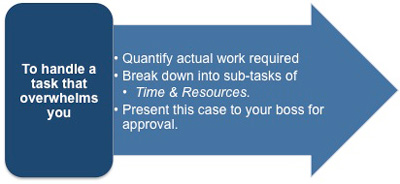Stop Procrastinating - Tasks That Appear Overwhelming
This trigger is another often-given reason for not starting a task. The thought process usually runs something like this:
That sounds like a lot of work. In fact I don't think I will be able to cope with it.
What if it turns out to be even worse than it sounds?
I can't bear to even think about it. I'll just ignore it and hopefully it will go away.
Unfortunately, these tasks seldom go away by themselves and the longer you leave it before taking action the worse the situation gets. Firstly, because the task is sitting there at the back of your mind slowly sapping your mental energy as you worry about it.
Secondly, because if it does turn out to be more work than you can cope with then someone, ideally your boss, needs to know this in order to do something about it. If this is the case then your boss would be justified in being annoyed that you had not brought the situation to his or her attention as soon as you could. |
The best way to deal with jobs like this is to assume that you are right - it really is an impossible task for you to do with the time and resources available. You need to sit down with the intention of quantifying the work involved so you can prove this to your boss.
The act of putting together a case to present to your boss will force you to plan how the task can be broken into sub-tasks and then to assign time and resource requirements to each. Doing this will mean that you have to question many of your initial assumptions and be realistic about what each stage will actually involve.
The end result will be a plan detailing the individual stages and a time requirement for each that you feel is accurate and that you could defend if your boss questioned it.
If it turns out that you really have been given a job that is impossible to complete with the time and resources you have available, then all you need to do is to approach your boss and make your case. Quite often, however, you will realize that the task is not as much work as you thought it was and you now have a plan for doing it in smaller chunks, each with an associated timeframe.
Either outcome is preferable to the initial situation where you were hoping that the task would just go away whilst knowing that this was very unlikely to happen. The longer you leave addressing the task the narrower your options are for resolving the problem.
With this approach, you are to some extent 'fooling yourself' into taking a first step to tackle something that you otherwise could not start. Often just taking the first step, regardless of how small, can serve as an inducement and thus a motivator for further action.
One of the reasons why people feel overwhelmed is because there is something missing that they need to complete the task but they are unable to articulate precisely what it is without thinking about the task in detail.
However, they can't bring themselves to think about the task in detail because it appears overwhelming and it is much easier to procrastinate. This is a so-called 'catch-22' scenario and the approach detailed above can help to break it.
One result of the plan you have developed should be a list of any resources you need, and it may be that there is something in this list that represents the 'missing' resource. If so, then you can use your plan to approach your boss in order to secure it. Our Overcoming Procrastination eBook is designed to help you understand the problem better and learn some successful ways of dealing with it.
You may also be interested in:
Stop Procrastinating | Symptoms of Procrastination | Why People Procrastinate | Dealing with Boring or Pointless Tasks | Dealing With Tasks Involving Confrontation | Tasks You Resent Being Given | Tasks You Don't Know How to Begin | Tasks You Are Afraid of Completing | Lack of Motivation.



